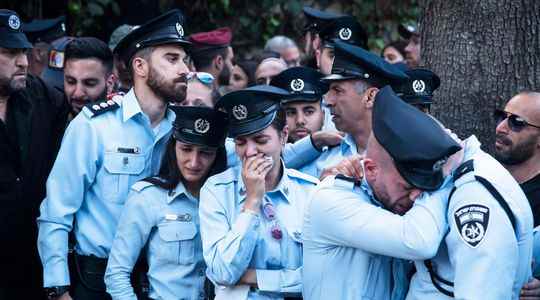In Israel, the hero of the moment is an Arab: Amir Khoury, a Christian from Nazareth. Tuesday evening, shortly before 8 p.m., this policeman was driving through the suburbs of Tel Aviv on his motorbike when his radio signaled an attack in Bnei Brak, the city of Orthodox Jews. Arriving at the scene, he sees a man armed with an M16 automatic rifle aiming at random passers-by. The terrorist, a Palestinian from a village near Jenin, in the West Bank, has just killed four people. The policeman manages to shoot him but he is hit by a bullet. Amir Khoury will succumb to his injuries in hospital a few hours later. He was 32 years old.
Thursday afternoon, the State of Israel organized a national funeral for the policeman who died as a hero. A final tribute was paid to him at the Basilica of the Annunciation in Nazareth, then he was buried in the military cemetery of Nof Hagalil, the Jewish quarter of the city. Exceptional fact: one hundred and fifty Orthodox Jews followed the procession and thanked it for having put an end to the killing. “He gave his life for others. He comes from another people but we are brothers. He fought for us, we had to come to his funeral,” testified Yaakov, an Orthodox from Bnei Brak interviewed. by Israeli television.
Israeli citizens behind the attacks
Two days before the Bnei Brak attack, an Israeli Arab killed two 19-year-old border guards, a Franco-Israeli and a Druze, in Hadera, in the north of the country. The previous Thursday, a Bedouin fatally stabbed four Israelis in Beer Sheva in the middle of the afternoon. Eleven dead in less than a week: Israel had not experienced such an indiscriminate outbreak of violence since the Intifada of the 2000s. “We are facing a wave of Arab terrorism,” said Prime Minister Naftali Bennett.
This new offensive thwarts the usual patterns. The Arabs are on the side of the aggressors but also on the side of the security forces. Two of the three terrorists are not Palestinians, but Israeli citizens, and lived in the Jewish state. The third, that of Bnei Brak, lived near Jenin in the West Bank, but he managed to cross the security wall and have a vehicle with an Israeli plate. The three attacks were not claimed by a Palestinian movement but by Daesh, the Islamic State organization. How, then, should the response to this “unaddressed terrorism”, as an Israeli columnist wrote this week, be elaborated?
On Wednesday morning, the security cabinet held an emergency meeting. He ordered a massive deployment of police in the streets, the mobilization of a thousand soldiers as reinforcements and an intensification of raids against Palestinian armed groups in the West Bank. In the night from Wednesday to Thursday, two Palestinian militiamen were killed in a shootout with a Tsahal commando, which ensures that they were linked to the Islamist movement Hamas. “Hamas is behind this wave of terror, confided an official of Shin Beth, the general intelligence service, on condition of anonymity. This is not the first time that the Islamist movement has tried to provoke an escalation by proxy and this this time he succeeded.”
The fear of a fractured society
Beyond the security challenge, the Israeli government is concerned about the cohesion of society. Israeli Arabs make up a fifth of the country’s population and their loyalty is often questioned by the Jewish majority. In the north of the country, a teacher was summoned by the Ministry of Education after publishing a post in support of terrorists. In Oum-el-Fahm, one of the largest Arab cities in the country and also the most Islamized, the site of the town hall offered its congratulations to the family of the Hadera terrorist. Faced with the outpouring of scandalized reactions on social networks, Interior Minister Ayelet Shaked telephoned the mayor of Oum-el-Fahm, who immediately had the message deleted, arguing that an unfortunate individual initiative of the site manager .
These incidents, however, do not seem to reflect the general trend in Israel. The attacks were widely condemned by representatives of the Arab community, be they Knesset members, local elected officials or religious leaders. “This wave of condemnations is historic, says Alaa Agbaria, a political adviser expert in the Israeli Arab sector. For once, I have seen very few declarations of support for terrorists. It is a silent change which testifies to a will of integration.”
As Ramadan begins, the Israeli authorities would like to share this optimism. Last year, at the same time, the holiest month of the Muslim year was marked by an unprecedented uprising by Israeli Arabs and an open conflict with the Gaza Strip.
